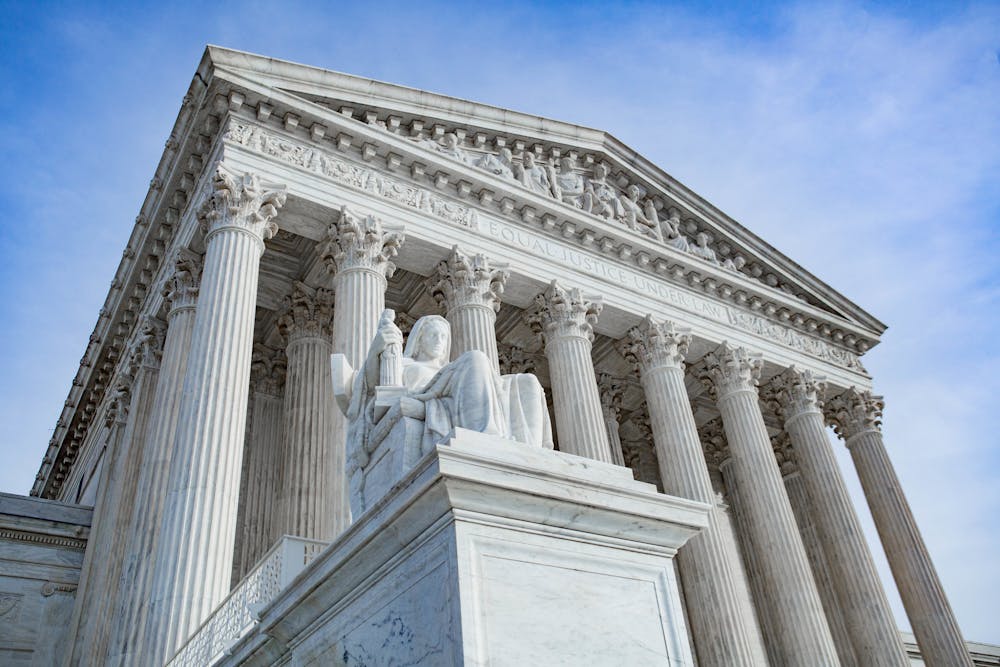As a Chinese citizen, I cannot vote in the U.S. I am currently in a quarantine hotel in Guangzhou, on the other side of the planet. Yet I have been thinking almost obsessively about the passing of Justice Ruth Bader Ginsburg and why this event has devastated and terrified me.
In eighth grade social studies, my first group project was a three-part rap about checks and balances. Despite the lame rhyming, the part of the project that is etched into my memory was the ultimate power of the judiciary branch. Simply, the three branches of government can beef all they want, but the Supreme Court always has the final say.
The Supreme Court played an pivotal role in countless moments in American history: deciding the “separate but equal” clause was “inherently unequal”; ensuring the accused know their rights before police interrogation; nullifying the claim for “executive privilege” by President Richard Nixon in the Watergate investigation; and prohibiting states from banning abortions.
With judicial review, the final right to interpret controversial clauses in the Constitution, the judicial branch represents not only unquestionable power but also a constant symbol of American ideals, standing unaffected by quarreling between political parties.
Lifelong tenure, designed to shield justices from political pressure, has helped maintain a delicate equilibrium among Supreme Court justices. This balance in ideology has generally been unperturbed by the political party in power. However, the death of Supreme Court Justice Antonin Scalia followed by the retirement of Justice Anthony Kennedy shattered this balance, all while tension between liberals and conservatives in the U.S. escalated.
RBG fought to ensure equality and spoke out for the underrepresented. She was outspoken in disapproval of the current administration. As she told her granddaughter before her death, “My most fervent wish is that I will not be replaced until a new president is installed.”
With the passing of Justice Ginsburg, I feared President Donald Trump would rush to nominate someone conservative and, most importantly, on his side. The official nomination of Judge Amy Coney Barrett came on Sept. 26, all but ensuring the fight for the future of the Supreme Court will be a partisan battle.
Barrett is well-known for being a religious conservative, raising questions about the fate of many progressive acts such as abortion rights and the Affordable Care Act. If she’s confirmed, the conservative sway of the court will be cemented for years.
The confirmation of late Justice Ginsburg and Justice Clarence Thomas took 49 days and 99 days, respectively. Given that Election Day is just over 30 days away, I fear that, with the help of the Republican-controlled Senate, a new Justice will be on the bench before the November election.
I fear this new Justice, Barrett or not, would stand behind a president who ran on a ticket of exclusion not tolerance, divisiveness not unity and privilege not equality.
In 2000, the Supreme Court had to weigh in when presidential election results were contested in Florida. I fear that a similar situation could take place in November. Having appointed three of the justices, President Trump would likely be favored, nullifying the democratic ideals behind each election and each peaceful transfer of power.
If there is one thing I am certain of, it’s that this administration would do whatever it takes to stay in power, even if it meant trampling core American values.
What I fear most is: Even if this is the end of Trump’s presidency, the Supreme Court he leaves behind will change the American future for decades, if not longer.
As a foreigner and as a non-white and not-so-wealthy person, I feel the increasing burden of being a minority. America is now in dire need of a justice system that can make the right call to stop the deportation of DREAMers, to legalize same-sex marriage and to call out the unconstitutional WeChat ban.
I fear the death of Justice Ginsburg will also be the death of justice in America.
Shizheng “JJ” Tie is a senior studying Environmental Engineering from Luoyang, China. She is a Senior Class Senator in the Student Government Association.





